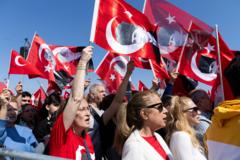A notable shift in U.S. foreign policy emerged as President Trump commended Turkey's President Erdogan amidst protests and opposition criticisms, contrasting sharply with previous endeavors under President Biden that focused on promoting democracy.
Trump’s Shift: Embracing Autocracy in Global Diplomacy

Trump’s Shift: Embracing Autocracy in Global Diplomacy
President Trump's recent actions suggest a departure from traditional U.S. diplomatic practices as he praises autocratic leaders while dismissing democratic allies.
When President Biden held democracy summits in 2021 and 2023, Turkey’s President Recep Tayyip Erdogan was notably absent, labeled by Biden as an “autocrat” undeserving of electoral legitimacy. In stark contrast, President Trump recently applauded Erdogan as “a good leader” despite escalating protests in Turkey following the arrest of Istanbul’s Mayor Ekrem Imamoglu, a key political opponent.
Since taking office 66 days ago, Trump has redefined U.S. diplomacy, veering away from the traditional emphasis on democratic values and instead favoring autocratic leaders. This shift has profound implications, signaling a willingness to align with those who undermine democratic institutions.
The implications extend globally, as Trump's actions serve as a model for leaders in countries such as Serbia and Israel, who may feel compelled to exploit democratic frameworks for personal or political gain. The former president's tolerance towards authoritarianism starkly contrasts with the bipartisan commitment of previously promoting democratic governance worldwide.
Erdogan's recent policies, which have faced substantial criticism for silencing dissent, were ignored during Trump's recent meeting with U.S. ambassadors. The praises for Erdogan’s leadership encapsulate Trump’s broader foreign policy ethos where loyalty and personal relationships seem to overshadow adherence to democratic values.
This evolving narrative in U.S. foreign relations not only reshapes the approach toward global governance but also raises pressing questions regarding the effectiveness of international alliances and the promotion of democracy amidst an increasingly polarized political landscape.






















